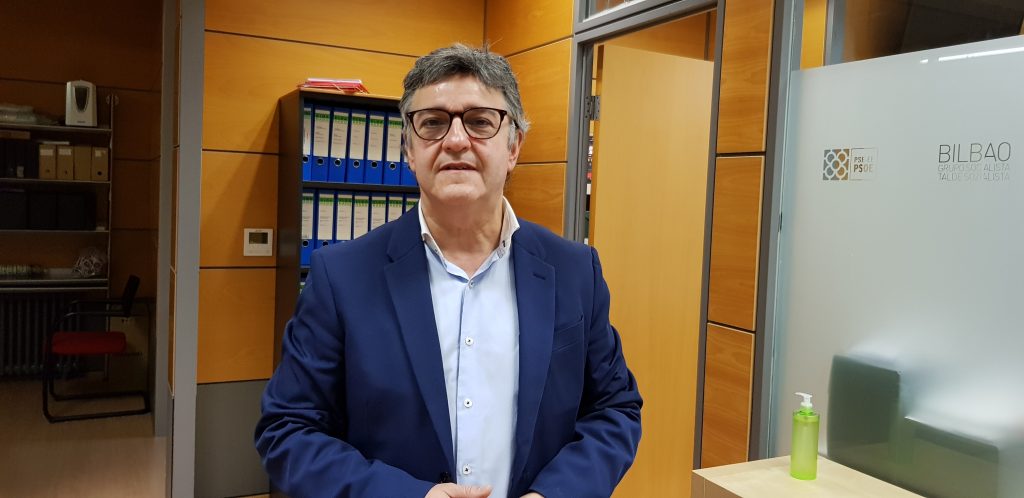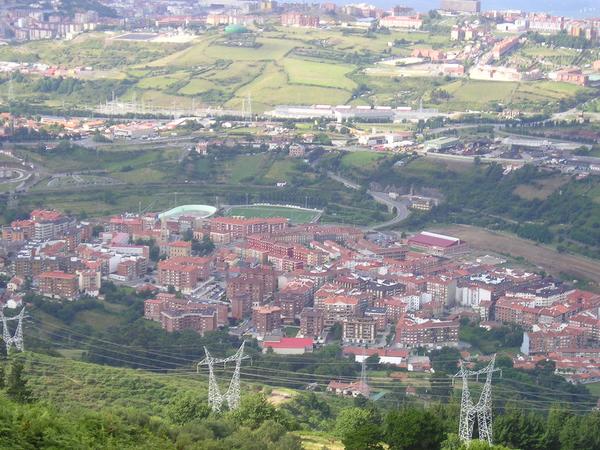Interview
«Opengela has made it easier for us to rehabilitate not only buildings in Otxarkoaga, but also spaces that were in disuse»

Jon Bilbao, Councillor for Housing and President of the Bilbao Municipal Housing Association.
The city of Bilbao is promoting one of the two pilot experiences of the Opengela project. The Otxarkoaga neighbourhood has set up an office to help the neighbourhood throughout the process of refurbishing its buildings. Within the scope of this European project, five blocks of buildings with 16 portals and a total of 240 dwellings are being rehabilitated.
In the case of Otxarkoaga, unlike the other pilot project in Txonta (in Eibar), the particularity lies in the fact that most of the housing (around 60%) is publicly owned, through the company Viviendas Municipales de Bilbao. Its president, in addition to being the councillor responsible for Housing, is Jon Bilbao.
Bilbao City Council has an ambitious urban regeneration plan for the Otxarkoaga neighbourhood, with the Orain Otxar plan. Within this framework, there is the Opengela project and the neighbourhood office that has been operating for almost two years. How do you assess the progress of the project so far?
It has been a very positive experience. The project has enabled us to rehabilitate not only residential buildings, but also spaces that were in disuse in the neighbourhood, giving them new life and services for Otxarkoaga. The office allows us to have a local view of the progress of the refurbishment work and to have a real awareness of what is happening in each dwelling and thus be able to make better decisions.
In this case, the City Council, as well as being the driving force behind the project, is also the owner of many of the homes that form part of it. What lessons and conclusions can be drawn from this dual status?
We had already carried out similar projects in Otxarkoaga and other neighbourhoods in Bilbao, which allowed us to use the experience we had gained in this project. The idea of tackling projects in public-private properties seems to us to be a great success that benefits both parties. The owners are delighted to be able to count on the professionalism and involvement of the Municipal Housing workers in the projects and we are delighted to be able to count on them in the various participatory projects, as well in the day-to-day running of the works.
How is the neighbourhood reacting to the creation of the office and all that it entails, and what receptivity and encouragement do you see?
We believe that the office is working very well. The people who are affected by the works know where to go with any doubts that may arise in a project of this magnitude and it allows us to organise ourselves better with all the agents involved in these processes.
This is a vulnerable neighbourhood, what difficulties are you encountering in intervening there, and how are you dealing with them?
The great difficulty is the uncertainty that comes with these major rehabilitation works, nothing that does not happen in other neighbourhoods. We deal with the problems one by one and try to provide ‘ad hoc’ solutions to each of the queries. Transparency and constant information about the projects help to deal with the inconvenience of such lengthy projects.
How is the financing of building renovation projects being resolved?
This is currently being channelled using a programme of instalments over a long period, combined with public financing via subsidies and the added improvements of financing from private entities and the construction companies awarded the works. A specific working methodology has been developed.
The European project will end in 2022. With the knowledge already accumulated over the years, what would you say to any other municipality interested in applying this model, both in the Basque Country and at the European level?
They should be encouraged to set up this type of mechanism in their municipalities. Many neighbourhoods need to undertake this type of projects and having neighbourhood offices facilitates the task of individualised assistance.


This project has received funding from the European Union’s Horizon 2020 research and innovation programme under grant agreement No 846707.
Otxar Opengela
Address: Avenida Pau Casals, No. 16, Otxarkoaga, Bilbao (In front of Plaza Kepa Enbeita)
Telephone: 946 85 19 32
E-mail: otxaropengela@vvmm.bilbao.eus
Txonta Opengela
Address: Calle Txonta No. 3, ground floor, Eibar
Telephone: 688 77 97 37
E-mail: txontabulegoa@eibar.eus
Copyright@2019 | All rights reserved | Legal notice | ![]()
![]()
Copyright@2019 | All rights reserved | Legal notice ![]()
![]()


